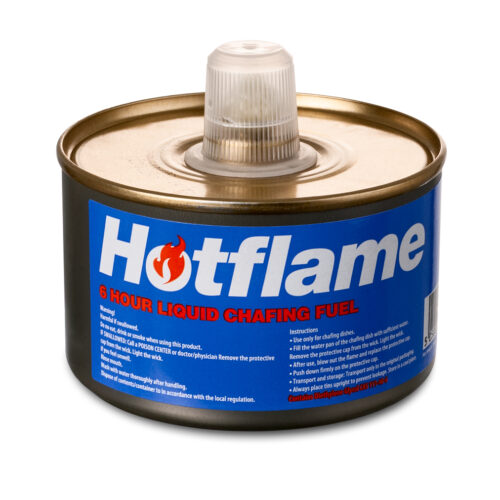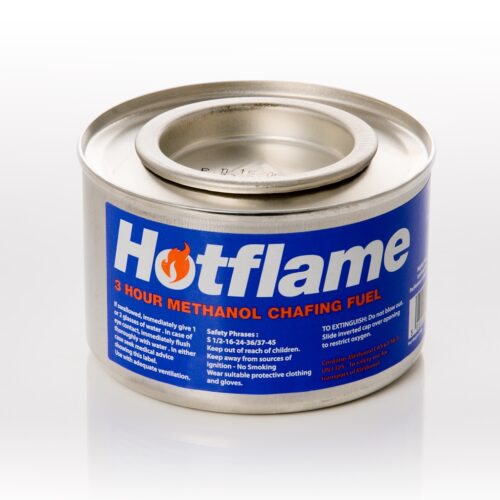Chafing fuel, sometimes spelled as “chafing fuel,” is a type of fuel used in chafing dishes or buffet warmers to keep food warm. It typically comes in small, portable cans or containers. Chafing fuel is designed to burn cleanly and safely, without producing smoke or odor. It’s commonly used in catering, buffet-style events, and food service settings where maintaining food at a consistent temperature is essential. The most common types of chafing fuels are gel-based, ethanol-based, or methanol-based. These fuels are often placed in a designated compartment beneath the chafing dish, where they’re ignited to generate heat.
Chaffing Fuel
A full selection of spill resistant, reliable fuel is available as part of our Hotflame range.
Including six-hour and four-hour glycol chafing fuel and methanol gel chafing fuel, in 200 gramme and four kilogramme sizes, our fuel comes in an array of handy size packs allowing stockists to sell in smaller quantities, as required.
Some of the questions we get asked the most
Chafing fuel is ignited to generate heat, which keeps food warm in chafing dishes. It typically burns cleanly and safely, without producing smoke or odor.
The most common types of chafing fuels are gel-based, ethanol-based, or methanol-based. Gel fuels are often preferred for their ease of use and safety features.
Yes, chafing fuel is generally safe for indoor use when used according to the manufacturer’s instructions. However, it’s essential to ensure proper ventilation and to keep the fuel away from any flammable materials.
the container, and the ambient temperature. Typically, chafing fuel can burn for several hours.
Some types of chafing fuel can be extinguished and relit later, while others are designed for single use only. It’s essential to follow the manufacturer’s instructions regarding extinguishing and reuse.
Chafing fuel is available at many catering supply stores, restaurant supply stores, and online retailers. It’s sold in various quantities and packaging options to suit different needs.
Yes, it’s crucial to handle chafing fuel with care and follow safety guidelines provided by the manufacturer. This includes keeping the fuel away from open flames, ensuring proper ventilation, and storing it in a cool, dry place away from heat sources.
Yes, many types of chafing fuel can be disposed of safely once they have cooled down completely. It’s essential to follow local regulations for the disposal of hazardous materials and to avoid pouring unused fuel down drains or disposing of it in the regular trash.
Yes, chafing fuel can be used for outdoor events, but it’s essential to consider factors such as wind and weather conditions that could affect its performance. Additionally, it’s crucial to follow safety precautions to prevent accidents.






